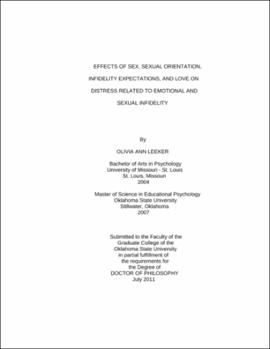| dc.contributor.advisor | Carlozzi, Alfred F. | |
| dc.contributor.author | Leeker, Olivia Ann | |
| dc.date.accessioned | 2013-11-26T08:32:17Z | |
| dc.date.available | 2013-11-26T08:32:17Z | |
| dc.date.issued | 2011-07 | |
| dc.identifier.uri | https://hdl.handle.net/11244/7190 | |
| dc.description.abstract | Scope and Method of Study: The purpose of this study was to investigate the influence of participant sex, sexual orientation, infidelity expectations, and love (intimacy, passion, commitment) on emotional responses (distress, anger, anxiety, jealousy, humiliation) to emotional and sexual infidelity. A mixed sample of undergraduate students and community members currently involved in committed romantic relationships completed a demographic form, continuous emotion ratings in response to hypothetical infidelity scenarios, the Infidelity Expectations Questionnaire (IEQ), and the Triangular Love Scale. Data were analyzed using multiple regression and mixed ANOVA statistical techniques. | |
| dc.description.abstract | Findings and Conclusions: Sex, sexual orientation, commitment, and intimacy among partners were significant predictors of some, if not all, emotional responses to sexual and emotional infidelity. On the other hand, passion and expectations about a partner's likelihood of committing infidelity were not significant predictors of emotional reactions to infidelity. Overall, sexual infidelity elicited more negative feelings than emotional infidelity. Women's and heterosexuals' emotion ratings in response to emotional and sexual infidelity were significantly higher than men's and lesbian and gay individuals' emotion ratings, respectively. These sex differences lend only marginal support to the evolutionary hypothesis and may have diminished due to the inclusion of lesbian and gay individuals and/or the use of continuous instead of forced-choice questions. Sex and sexual orientation differences were also found regarding the degree to which specific emotions were reported in response to sexual and emotional infidelity. For example, females were much more humiliated than men in response to sexual infidelity, and heterosexuals reported significantly more humiliation than lesbian and gay individuals in response to both types of infidelity. Overall, the sex and sexual orientation differences that were found may reflect Westernized views of infidelity along with societal norms that vary based on gender and sexual orientation. Mental health professionals can use these findings to help clients' cope with the negative effects of infidelity on romantic relationships. | |
| dc.format | application/pdf | |
| dc.language | en_US | |
| dc.rights | Copyright is held by the author who has granted the Oklahoma State University Library the non-exclusive right to share this material in its institutional repository. Contact Digital Library Services at lib-dls@okstate.edu or 405-744-9161 for the permission policy on the use, reproduction or distribution of this material. | |
| dc.title | Effects of sex, sexual orientation, infidelity expectations, and love on distress related to emotional and sexual infidelity | |
| dc.contributor.committeeMember | Romans, John S. C. | |
| dc.contributor.committeeMember | Harrist, Steve | |
| dc.contributor.committeeMember | Dorton, Julie Gallaher | |
| dc.contributor.committeeMember | Miller, Janice Williams | |
| osu.filename | Leeker_okstate_0664D_11501 | |
| osu.accesstype | Open Access | |
| dc.type.genre | Dissertation | |
| dc.type.material | Text | |
| dc.subject.keywords | emotional distress | |
| dc.subject.keywords | emotional infidelity | |
| dc.subject.keywords | love | |
| dc.subject.keywords | sex differences | |
| dc.subject.keywords | sexual infidelity | |
| dc.subject.keywords | sexual orientation difference | |
| thesis.degree.discipline | Educational Studies | |
| thesis.degree.grantor | Oklahoma State University | |
